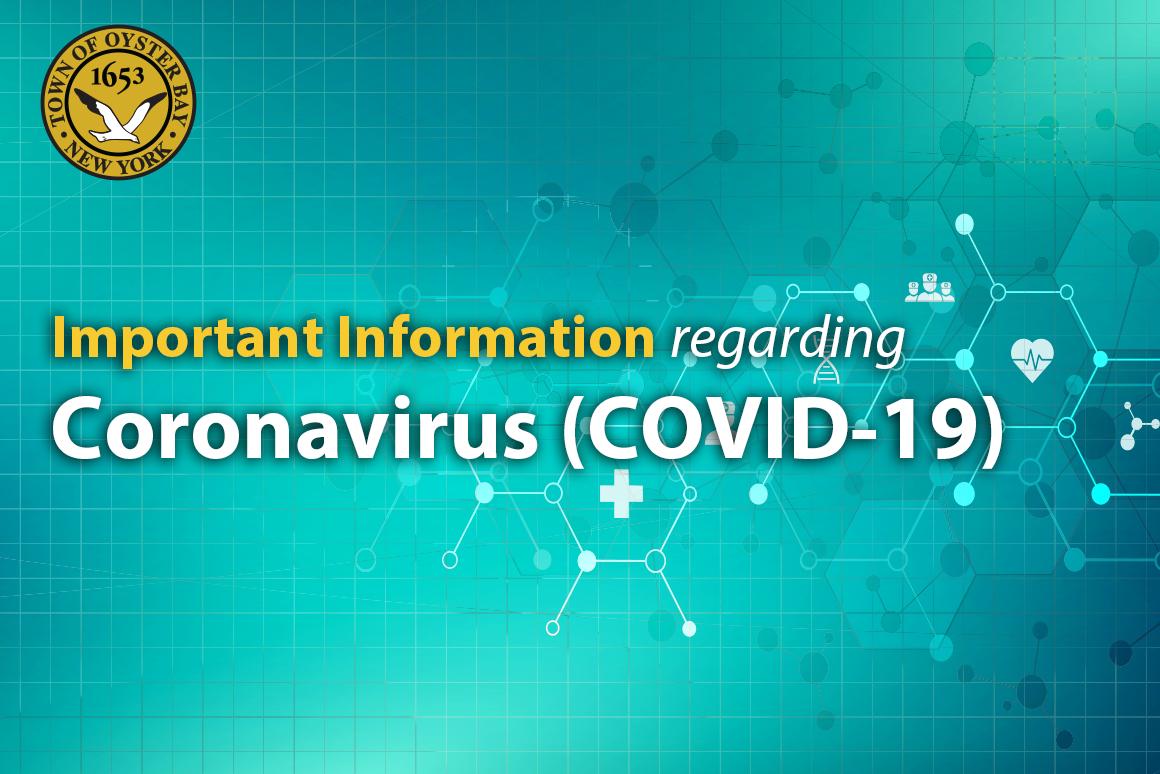Important Information Regarding COVID-19 (Coronavirus)
For the most up to date information, visit the sites below.
Click here to visit the NYS Department of Health
Click here to visit the Nassau County Department of Health
Click here to visit the Center for Disease and Control
Click here for latest statistics on Global Cases on Coronavirus
The information regarding coronavirus is constantly developing. The number of confirmed cases across New York State changes daily. As this is a rapidly changing situation, please visit the websites listed above for the most up to date information.
HERE’S WHAT THE TOWN IS DOING TO PROTECT FACILITIES
The Town of Oyster Bay Health and Public Safety Task Force is taking the appropriate measures to address COVID-19. Our protocols meet or exceed the guidelines of the Centers for Disease Control (CDC) and local Health authorities. The Department of General Services has intensified cleaning procedures to frequently disinfect touched surfaces, desktops, countertops, tables, doorknobs, light switches, hand rails, toilets, faucets, sinks, public phones and public computer keyboards (just to name a few). The department will regularly empty all restroom waste paper baskets and spray disinfectant in restrooms and on waste paper baskets.
WHAT IS COVID-19?
COVID-19 is the infectious disease caused by the most recently discovered coronavirus. This new virus and disease were unknown before the outbreak began in Wuhan, China, in December 2019.
PREVENTION
While there is currently no vaccine to prevent this virus, these simple steps can help stop the spread of this and other respiratory viruses:
• Wear a mask or face covering when unable to socially distance yourself from others.
• Wash your hands often with soap and water for at least 20 seconds. If soap and water are not available, use an alcohol-based hand sanitizer.
• Avoid touching your eyes, nose and mouth with unwashed hands.
• Avoid close contact with people who are sick.
• Stay home when you are sick.
• Cover your cough or sneeze with a tissue, then throw the tissue in the trash.
• Clean and disinfect frequently touched objects and surfaces.
WHAT ARE SYMPTOMS OF COVID-19?
The most common symptoms of COVID-19 are fever, tiredness, and dry cough. Some patients may have aches and pains, nasal congestion, runny nose, sore throat or diarrhea. These symptoms are usually mild and begin gradually. Some people become infected but don’t develop any symptoms and don’t feel unwell. Most people (about 80%) recover from the disease without needing special treatment. Around 1 out of every 6 people who gets COVID-19 becomes seriously ill and develops difficulty breathing. Older people, and those with underlying medical problems like high blood pressure, heart problems or diabetes, are more likely to develop serious illness. People with fever, cough and difficulty breathing should seek medical attention. CDC believes at this time that symptoms may appear in as few as 2 days or as long as 14 days after exposure to the virus.
PROTECTION MEASURES FOR EVERYONE
Stay aware of the latest information on the COVID-19 outbreak, available through the health department or CDC website. You can reduce your chances of being infected or spreading COVID-19 by taking some simple precautions:
• Wear a mask or face covering when unable to socially distance yourself from others.
• Regularly and thoroughly clean your hands with an alcohol-based hand rub or wash them with soap and water.
• Maintain at least 6 feet of distance between yourself and anyone who is coughing or sneezing.
• Avoid touching eyes, nose and mouth.
• Make sure you, and the people around you, follow good respiratory hygiene. This means covering your mouth and nose with your bent elbow or tissue when you cough or sneeze. Then dispose of the used tissue immediately.
• Stay home if you feel unwell. If you have a fever, cough and difficulty breathing, seek medical attention and call in advance. Follow the directions of your local health authority.

